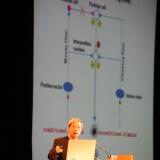2007 Gruber Neuroscience Prize
Director of the Osaka Bioscience Institute, Professor Shigetada Nakanishi has pioneered research into communication between nerve cells in the brain. He and his research team unraveled much of the molecular detail of information transfer and processing, and provided pharmacologists with many new possibilities for drug design.
2007 Neuroscience Prize Recipient
Laureate Profile
Over the last forty years, Shigetada Nakanishi has unraveled many of the molecular secrets that underpin the function of the human nervous system. His work has created new tools for researchers, and new drug targets for pharmacologists.
A full understanding of the workings of the human brain is still decades or more away. But Shigetada Nakanishi’s work is bringing it closer. He is an unusual researcher who has both created sophisticated tools to help us investigate the brain, and used these tools to make remarkable discoveries about the molecular processes used throughout the nervous system: our senses, movement control, cognition, learning, memory and much more.
Nakanishi’s achievements include:
- Expressing genes in frog eggs to find new genes and proteins associated with brain function
- Using this technique to identify receptors in the membranes of neurons that trigger the biochemical steps that lead to learning, memory and vision
- Understanding how some of these proteins act in the “electrical” circuits formed between neurons.
Through his broad approach Shigetada Nakanishi is laying the foundations for us to understand how our brains work – from the molecular level through to the complex interactions between networks of neurons.
For his achievements, Nakanishi, director of the Osaka Bioscience Institute, will receive the 2007 Gruber Prize for Neuroscience on November 4, 2007 at the Society for Neuroscience annual meeting in San Diego, California. The prize consists of a gold medal and $US500,000.
Citation
The Peter and Patricia Gruber Foundation proudly presents the 2007 Neuroscience Prize to Shigetada Nakanishi who developed tools that enabled him and others to probe fundamental molecular mechanisms of nervous system function. By expressing genes in frog oocytes, he discovered new genes of the nervous system and identified novel membrane receptors. Some of these receptors respond to peptide hormones and others to glutamate, the major excitatory chemical signal of the brain. These receptors are critical for many vital processes of the nervous system, including learning, memory and vision.
More recently, he has devised and applied elegant techniques to understand in detail how receptors on neuron membranes act at critical stages in the operation of synaptic circuits. His work integrates multiple levels of neuroscience, from molecules to complex neuronal networks.





























